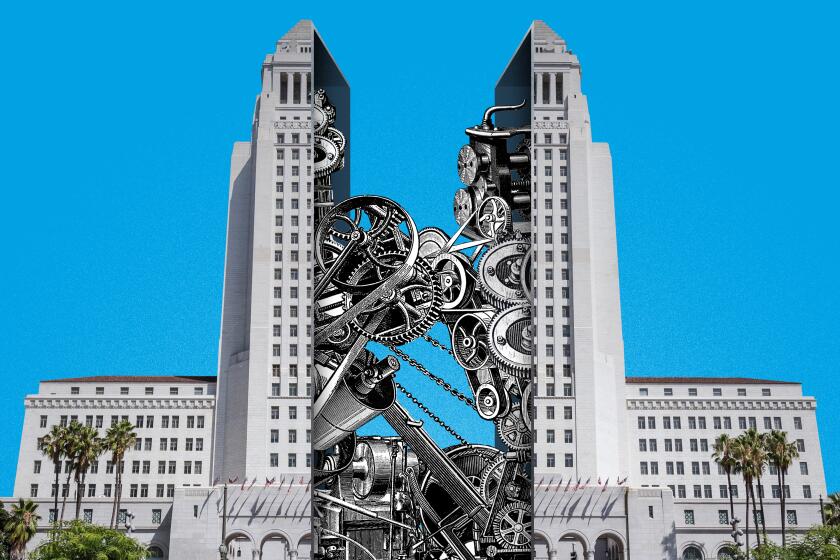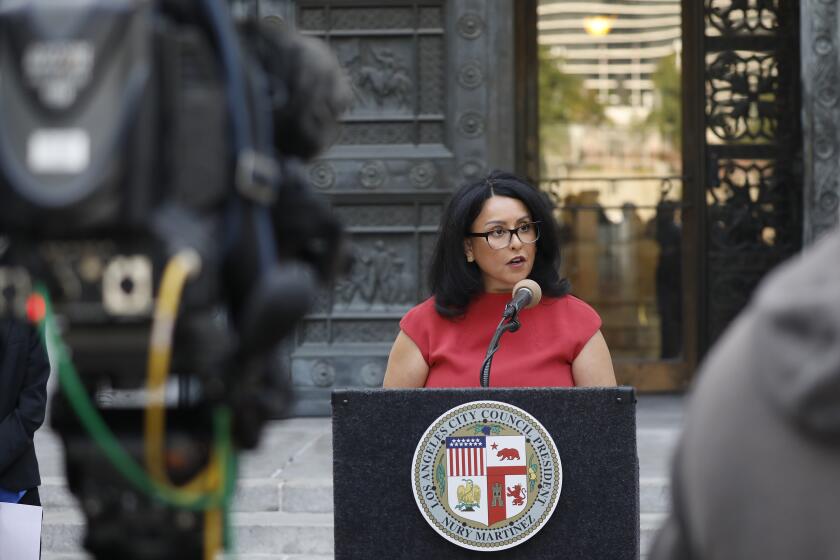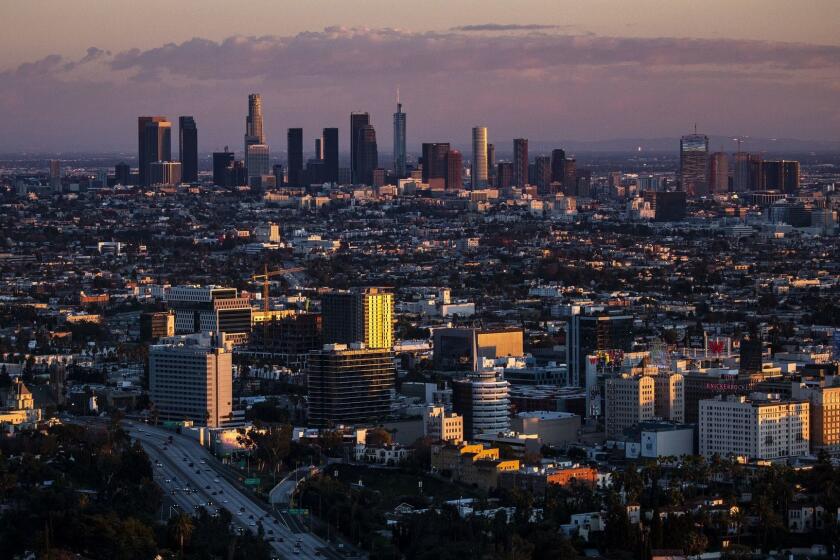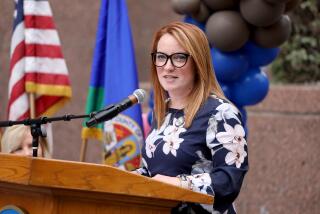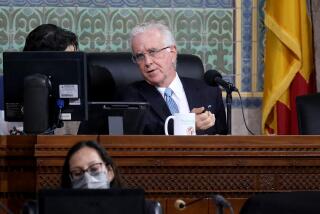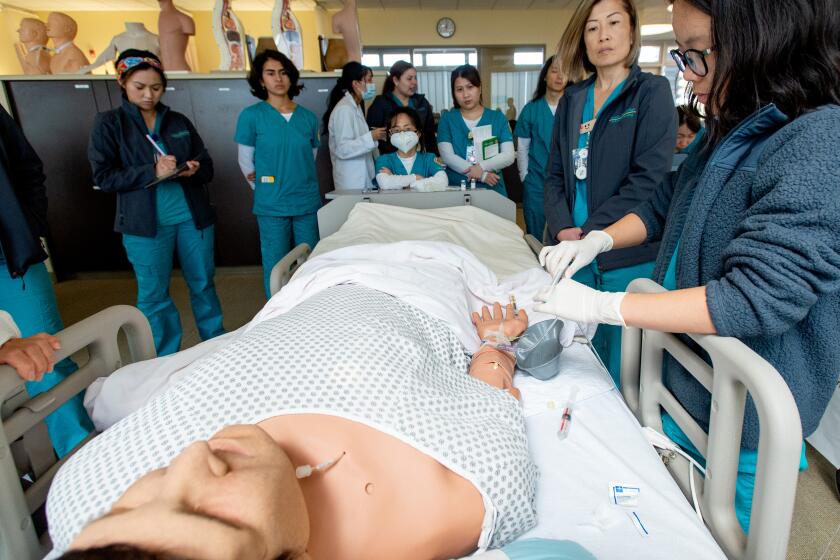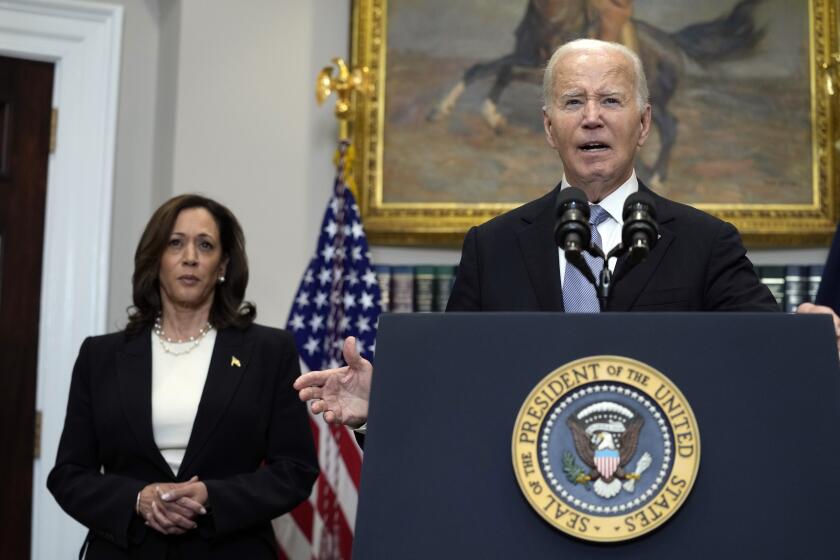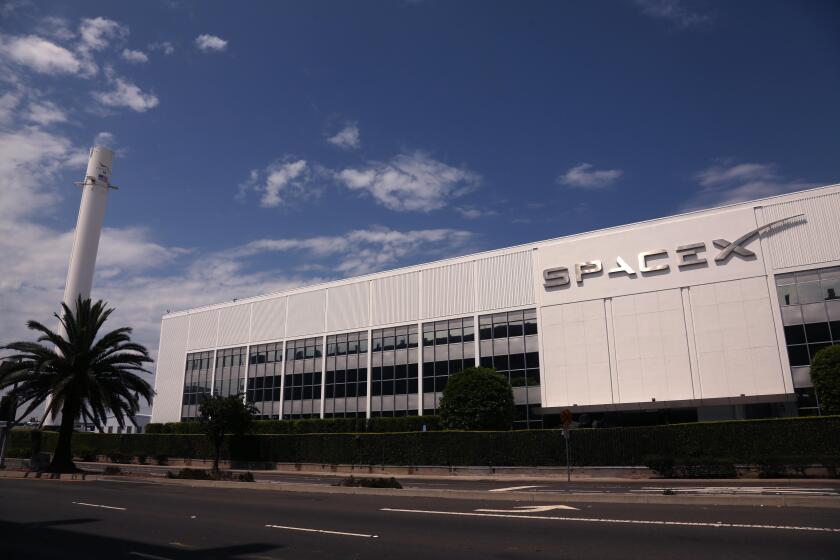Editorial: Most of L.A.’s current and future leaders support City Hall reform. Good. Now make it happen

There is strong momentum among Los Angeles’ current and future leaders for City Hall reform. In a survey conducted by The Times Editorial Board, respondents overwhelmingly said they would support ballot measures to adopt independent redistricting and enlarge the City Council, and back changes to reduce council members’ power over land-use decisions.
What a difference a scandal makes.
Just a few months ago, City Council leaders failed to put on the Nov. 8 ballot a proposed measure to create a new independent citizen commission to draw council district lines. The idea of expanding the City Council beyond the current 15 seats wasn’t being seriously considered. And hardly anybody wanted to talk about limiting council members’ enormous power over real estate development in their districts.
Then, last month, a secret audio recording revealed the then-council president and two council colleagues making deplorable and racially divisive comments about their colleagues and constituents, while plotting how to redraw council district lines to their benefit. The public condemnation was swift, and so were the calls for the council members’ resignations — from grass-roots community activists to national leaders including President Biden. (So far, only council President Nury Martinez has stepped down from elected office.)
Los Angeles City Hall has been rocked by scandal after scandal, but now there’s momentum to reform city government.
But unlike past City Hall scandals — and there have been many in the last few years — both good-government advocates and elected officials have coalesced around proposals that would eliminate the kind of backroom dealing heard on the leaked audio and address the representation and corruption issues that have undermined public trust in city government.
The Times editorial board sent the survey to the current mayor, city attorney, city controller and council members, along with candidates for those offices on the November ballot. Thirty people received the survey; 25 filled it out; five declined or did not respond.
We posed four questions. We asked if they support putting a measure on the ballot to create an independent redistricting commission, similar to what Los Angeles County and the state of California have. (City Council members can vote to put measures on the ballot.) Every single respondent said yes. There was widespread agreement that politicians should not have a hand in drawing their own districts, as they do now.
“For decades, politicians in Los Angeles have manipulated the redistricting process to preserve their own power. In a functioning democratic system, voters should choose their representatives — not the other way around,” Faisal Gill, candidate for city attorney, wrote in a response that was echoed by many respondents.
Council President Nury Martinez’s vote to appoint Herb Wesson to the City Council had the appearance of a backroom deal.
The survey also asked if they would back putting a measure on the ballot to enlarge the City Council, which currently has 15 members representing more than 260,000 constituents each. L.A. hasn’t increased the number of council districts since 1924, and the city now has the largest council districts by population in the country. The great majority of respondents said it was a good idea to add more council districts and council members.
“Now each council district is the size of Buffalo, New York or Boise, Idaho. Smaller districts will make council members more responsive, empower residents to more easily hold council members accountable and increase the council’s diversity,” wrote City Attorney Mike Feuer, who has proposed doubling the number of council districts to 30.
There have been few formal pitches from inside or outside City Hall to expand the council, nor has there been discussion of how many districts are enough — 25? 31? 45? A few respondents said they weren’t ready to back a ballot measure yet.
“I would have to say no until the idea is thoroughly researched. While I appreciate that smaller districts could be a route to improve representation, we need to evaluate whether this would help or create more problems,” wrote mayoral candidate Rep. Karen Bass (D-Los Angeles).
Respondents were also asked about removing City Council members’ discretion over land-use decisions. L.A.’s approval process lets council members decide whether a development project gets an exemption from zoning and land-use rules, or whether it should be granted a tax break. Such power invites corruption, and it’s at the heart of the federal indictment of former Councilmember Jose Huizar. Prosecutors allege he turned his power over development decisions into a criminal enterprise that raked in more than $1.5 million in cash and other benefits from companies looking to build in L.A.
In June 1999, Los Angeles voted to remake itself.
Most respondents — 72% — said they want to limit that power as part of a broader effort to modernize land-use plans and development processes.
“Community plans haven’t been updated. Many developments require exemptions and variances, which is an opportunity for councilmembers to explicitly or implicitly extract campaign cash from developers,” wrote Councilmember Nithya Raman, a former urban planner who has been pushing the city to make it easier to build. “Discretion also prevents the construction of housing, including affordable housing and homeless housing.”
But other respondents argued that council member discretion is an important balance against city planning and building agencies, the mayor’s office and developers.
“The real estate and building industry is just as plagued by racism and inequity as any other, “ wrote Councilmember Marqueece Harris-Dawson. “One of the only ways for residents to fight back is through their elected officials. Stripping the City Council of land-use oversight opens up low-income and Black communities to even further ghettoization, blight, and inequity.”
Lastly, the survey allowed respondents to pitch their own ideas for reform. Among the ideas proposed were strengthening the independence of the city’s Ethics Commission, changing the campaign finance system to help grass-roots candidates, requiring regular updates of community land-use plans and the city’s General Plan, and adopting rules outlining clearly when elected officials can be suspended, and how and under what circumstances suspended council members should be replaced.
The good news is that L.A.’s current and future leaders want change. The harder part is making it happen — and it will happen only if these long-overdue reforms are top priorities for city leaders starting right now. They need to know that the people of Los Angeles will hold them to these commitments.
Read survey responses about an independent redistricting commission, a larger City Council and limiting council members’ discretion over land-use decisions.
More to Read
A cure for the common opinion
Get thought-provoking perspectives with our weekly newsletter.
You may occasionally receive promotional content from the Los Angeles Times.
